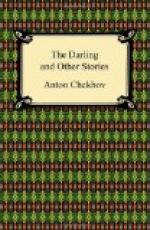Now she was absolutely alone. Her father had long been dead, and his armchair lay in the attic, covered with dust and lame of one leg. She got thinner and plainer, and when people met her in the street they did not look at her as they used to, and did not smile to her; evidently her best years were over and left behind, and now a new sort of life had begun for her, which did not bear thinking about. In the evening Olenka sat in the porch, and heard the band playing and the fireworks popping in the Tivoli, but now the sound stirred no response. She looked into her yard without interest, thought of nothing, wished for nothing, and afterwards, when night came on she went to bed and dreamed of her empty yard. She ate and drank as it were unwillingly.
And what was worst of all, she had no opinions of any sort. She saw the objects about her and understood what she saw, but could not form any opinion about them, and did not know what to talk about. And how awful it is not to have any opinions! One sees a bottle, for instance, or the rain, or a peasant driving in his cart, but what the bottle is for, or the rain, or the peasant, and what is the meaning of it, one can’t say, and could not even for a thousand roubles. When she had Kukin, or Pustovalov, or the veterinary surgeon, Olenka could explain everything, and give her opinion about anything you like, but now there was the same emptiness in her brain and in her heart as there was in her yard outside. And it was as harsh and as bitter as wormwood in the mouth.
Little by little the town grew in all directions. The road became a street, and where the Tivoli and the timber-yard had been, there were new turnings and houses. How rapidly time passes! Olenka’s house grew dingy, the roof got rusty, the shed sank on one side, and the whole yard was overgrown with docks and stinging-nettles. Olenka herself had grown plain and elderly; in summer she sat in the porch, and her soul, as before, was empty and dreary and full of bitterness. In winter she sat at her window and looked at the snow. When she caught the scent of spring, or heard the chime of the church bells, a sudden rush of memories from the past came over her, there was a tender ache in her heart, and her eyes brimmed over with tears; but this was only for a minute, and then came emptiness again and the sense of the futility of life. The black kitten, Briska, rubbed against her and purred softly, but Olenka was not touched by these feline caresses. That was not what she needed. She wanted a love that would absorb her whole being, her whole soul and reason—that would give her ideas and an object in life, and would warm her old blood. And she would shake the kitten off her skirt and say with vexation:
“Get along; I don’t want you!”
And so it was, day after day and year after year, and no joy, and no opinions. Whatever Mavra, the cook, said she accepted.




